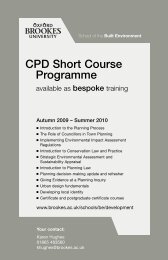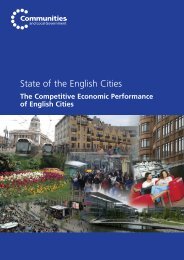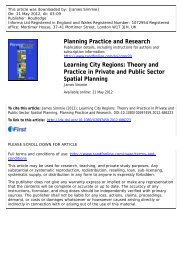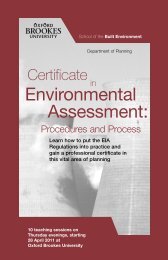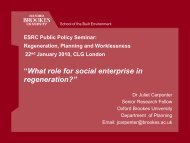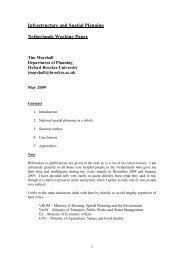History Matters: Path dependence and innovation in British city ...
History Matters: Path dependence and innovation in British city ...
History Matters: Path dependence and innovation in British city ...
You also want an ePaper? Increase the reach of your titles
YUMPU automatically turns print PDFs into web optimized ePapers that Google loves.
<strong><strong>in</strong>novation</strong>. The Cambridge cluster was<br />
narrowly focused, <strong>in</strong> sectoral terms, <strong>in</strong> the<br />
early years. But successive new technological<br />
paths have been created, some draw<strong>in</strong>g on<br />
pre-exist<strong>in</strong>g paths, <strong>and</strong> others entirely new.<br />
The whole process has fostered – <strong>and</strong> been<br />
fuelled by – the co-evolution of a highly<br />
entrepreneurial environment, an <strong>in</strong>creas<strong>in</strong>gly<br />
positive <strong>in</strong>volvement by the university <strong>and</strong> a<br />
raft of <strong>in</strong>stitutions <strong>and</strong> support<strong>in</strong>g knowledge<strong>in</strong>tensive<br />
services (such as venture capital<br />
organisations) which also make up the<br />
Cambridge cluster. In short, a host of external<br />
economies of localisation have helped provide<br />
the cluster with cont<strong>in</strong>ued momentum.<br />
Swansea illustrates only too clearly how<br />
difficult it is to escape the past, to shed the<br />
legacy of an old locked-<strong>in</strong> economy. But even<br />
here, one wonders why it is prov<strong>in</strong>g so difficult<br />
to forge a new pathway of development?<br />
Evidence from other old <strong>in</strong>dustrial cities <strong>in</strong><br />
Europe <strong>and</strong> the USA suggests that escape<br />
is possible. In Part 1 we identified a number<br />
of ways such places can reconfigure their<br />
economies. In some cases it has proved<br />
possible to draw on the skills, specialisms<br />
<strong>and</strong> technologies <strong>in</strong>herited from the past <strong>and</strong><br />
upgrade <strong>and</strong> reorient them towards new, more<br />
technologically advanced but related <strong>in</strong>dustries<br />
<strong>and</strong> specialisms. In other cases, foreign firms<br />
have brought <strong>in</strong> new technology <strong>and</strong> new<br />
<strong>in</strong>dustry that has become the centre of gravity<br />
of a new phase of <strong>in</strong>novative development. It is<br />
widely recognised that there needs to be a step<br />
change <strong>in</strong> Swansea – <strong>and</strong> Wales more generally<br />
– <strong>and</strong> that one potentially successful way of<br />
do<strong>in</strong>g that is to br<strong>in</strong>g <strong>in</strong> new th<strong>in</strong>k<strong>in</strong>g <strong>and</strong> new<br />
companies. As one respondent puts it:<br />
“These companies come <strong>in</strong>to Technium,<br />
<strong>and</strong> they’re two men <strong>and</strong> a dog, <strong>and</strong> if they<br />
grow to five men <strong>and</strong> a dog, that’s good,<br />
but it would be great if I could f<strong>in</strong>d one <strong>in</strong><br />
there that grows to 500 men <strong>and</strong> a dog,<br />
because I th<strong>in</strong>k it’s those step changes that<br />
we need.” [Interview SW001]<br />
The challenge for this sort of strategy, of<br />
course, is to f<strong>in</strong>d the right sort of companies<br />
that will embed themselves locally <strong>and</strong> that will<br />
act as a magnet <strong>and</strong> a catalyst for <strong><strong>in</strong>novation</strong>,<br />
entrepreneurship <strong>and</strong> new firm formation.<br />
Cambridge succeeds <strong>in</strong> attract<strong>in</strong>g the research<br />
labs of mult<strong>in</strong>ational companies precisely<br />
because it already has a thriv<strong>in</strong>g high-tech<br />
economy. Start<strong>in</strong>g the process from scratch<br />
is another matter. Swansea’s earlier attempt<br />
to attract foreign companies, <strong>in</strong> the form of<br />
electronics assembly plants, illustrates how<br />
precarious or disappo<strong>in</strong>t<strong>in</strong>g foreign <strong>in</strong>vestment<br />
can be. The <strong>city</strong>’s failure to develop an LCD<br />
<strong>and</strong> plasma-based television sector to replace<br />
its role as a production platform for the old<br />
CRT television shows how difficult it can be<br />
even to upgrade an exist<strong>in</strong>g path of <strong>in</strong>dustrial<br />
activity. Instead, Swansea has become the<br />
location for an exp<strong>and</strong><strong>in</strong>g public sector, which<br />
whilst provid<strong>in</strong>g jobs, is not always a basis<br />
for <strong>in</strong>novative economic growth. Indeed, the<br />
dom<strong>in</strong>ance of the public sector <strong>in</strong> Swansea<br />
is seen by respondents as a h<strong>in</strong>drance to the<br />
growth of <strong><strong>in</strong>novation</strong> <strong>and</strong> the private sector:<br />
“We exist largely on the public sector, the<br />
<strong>in</strong>dulgence of the public sector. And to<br />
break out of it, I come back aga<strong>in</strong>, we need<br />
someth<strong>in</strong>g transformational.” [Interview<br />
SW004]<br />
Hav<strong>in</strong>g highlighted the success of Cambridge,<br />
however, it is also important to note that <strong>in</strong> the<br />
last three years, concern has emerged over the<br />
future growth of its high-tech cluster (Library<br />
House, 2007). There are several signs that its<br />
growth momentum has slowed: patent activity<br />
has eased noticeably, the number of new<br />
firms has dropped back, <strong>and</strong> there has been a<br />
slowdown <strong>in</strong> venture-backed <strong>in</strong>vestment.<br />
“The … analysis suggests a rather<br />
bleak picture for the Cambridge cluster.<br />
Overall the cluster is los<strong>in</strong>g ground to<br />
its competitors, particularly London. At<br />
a sectoral level, the cluster is strong <strong>in</strong><br />
stagnat<strong>in</strong>g areas such as life sciences<br />
but weak <strong>in</strong> emerg<strong>in</strong>g areas like Web,<br />
Mediatech <strong>and</strong> Clean Energy.” (Library<br />
House, 2007, p. 23)<br />
There is, then, a debate as to whether<br />
Cambridge is miss<strong>in</strong>g the boat on Web-based<br />
<strong>and</strong> Media-based <strong>in</strong>novative activity (socalled<br />
soft <strong>in</strong>novative sectors) – <strong>and</strong> whether<br />
this matters. As the Library House Report<br />
acknowledges, London already had a head start<br />
<strong>in</strong> these activities, so it would be unrealistic for<br />
Cambridge also to be develop<strong>in</strong>g a lead<strong>in</strong>g role<br />
<strong>in</strong> this part of the ‘new economy’:<br />
“…the failure of Cambridge to harness<br />
the growth of the Web <strong>and</strong> new media<br />
<strong>in</strong>dustries is likely the result of the<br />
fundamental natures of these new sectors<br />
than a specific defect <strong>in</strong> the development<br />
of the Cambridge cluster. London, simply<br />
because of its vast size, is far more likely<br />
to be a leader <strong>in</strong> soft <strong><strong>in</strong>novation</strong>.” (Library<br />
House, 2007, p.24)<br />
60



